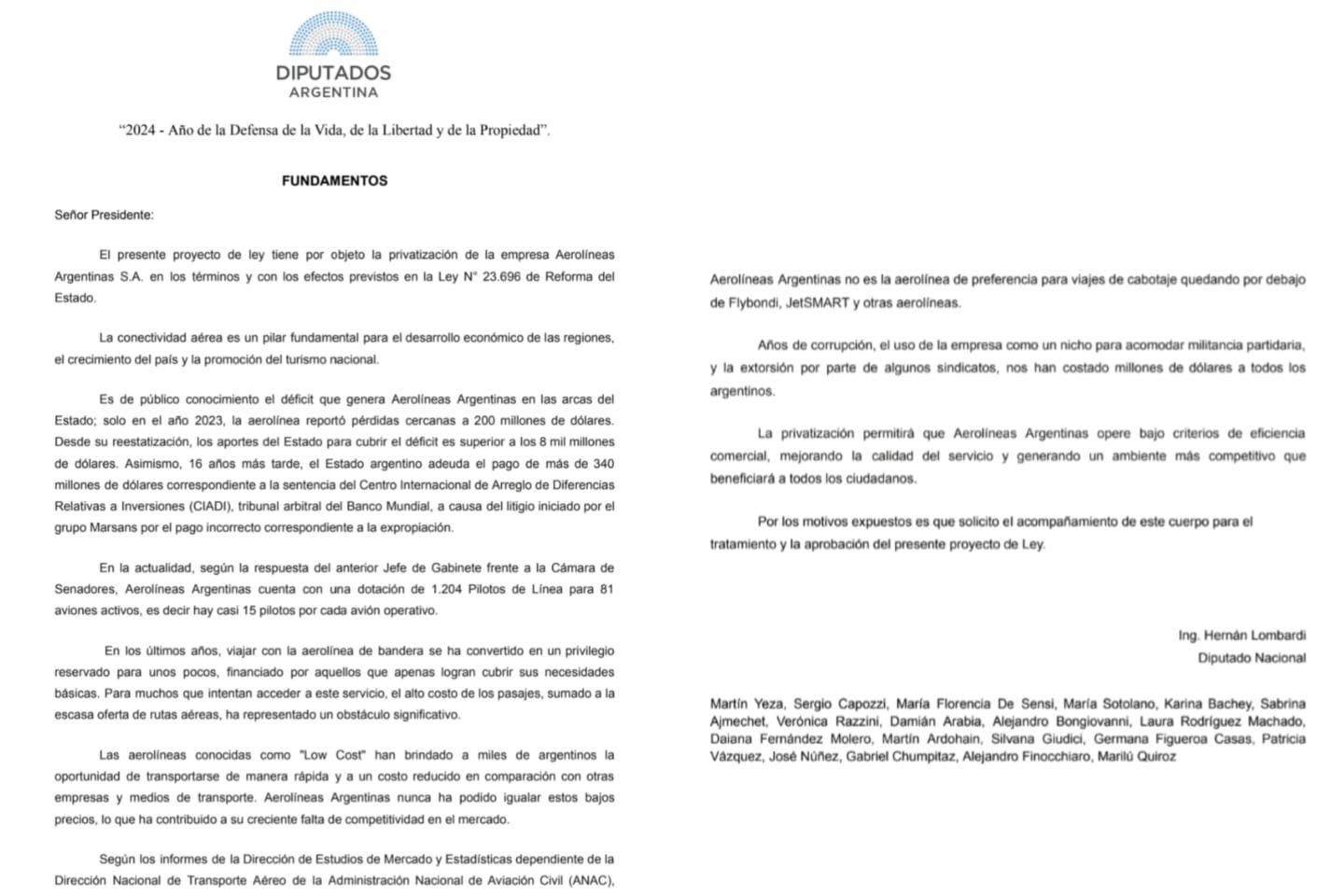Privatization of Aerolíneas Argentinas back on the table with new bill
A group of 20 representatives from the Pro party, led by Hernán Lombardi, presented a bill aimed at privatizing Aerolíneas Argentinas, a company that returned to state control in 2008 after 18 years of being managed by Iberia, the SEPI, American Airlines, and Marsans.
«Air connectivity is a fundamental pillar for the economic development of the regions, the growth of the country, and the promotion of domestic tourism,» the bill’s rationale states.
«It is public knowledge the deficit that Aerolíneas Argentinas generates for the state’s finances: in 2023 alone, the airline reported losses close to 200 million dollars. Since its renationalization, the state’s contributions to cover the deficit exceed 8 billion dollars. Furthermore, 16 years later, the Argentine government still owes more than 340 million dollars for a judgment from the International Centre for Settlement of Investment Disputes (ICSID), the arbitration court of the World Bank, following a lawsuit initiated by the Marsans group over improper compensation for the expropriation,» it continues.
The text then mentions that Aerolíneas Argentinas employs 1,204 pilots, which represents almost 15 per operational aircraft (81 in total), although no comparison with other companies is made.
It also notes that «in recent years, flying with the flag carrier has become a privilege reserved for a few, funded by those who barely manage to cover their basic needs. For many trying to access this service, the high cost of tickets, along with the limited offer of air routes, has been a significant obstacle.»
Lombardi’s bill also argues that low-cost airlines have provided thousands of Argentines the opportunity to travel quickly and at a lower cost compared to other companies and means of transportation.
It also mentions that «Aerolíneas Argentinas has never been able to match these low prices, which has contributed to its growing lack of competitiveness in the market,» an exaggerated claim given that on many routes, equal or even lower fares have been seen, depending on key factors such as the route, purchase date, and advance booking, among others.
«Years of corruption, the use of the company as a niche to accommodate political operatives, and extortion by some unions have cost all Argentines millions of dollars,» Lombardi’s bill adds in its rationale, claiming that «the privatization will allow Aerolíneas Argentinas to operate under commercial efficiency criteria, improving service quality and generating a more competitive environment that will benefit all citizens.»
This bill, which, besides Lombardi, is signed by national representatives Martin Yeza (Buenos Aires), Sergio Capozzi (Río Negro), Maria Florencia De Sensi (Buenos Aires), María Sotolano (Buenos Aires), Karina Bachey (San Luis), Sabrina Ajmechet (Buenos Aires City), Verónica Razzini (Santa Fe), Damián Arabia (Buenos Aires City), Alejandro Bongiovanni (Santa Fe), Laura Rodriguez Machado (Córdoba), Daiana Fernández Molero (Buenos Aires City), Martin Ardohain (La Pampa), Silvana Giudici (Buenos Aires City), Germana Figueroa Casas (Santa Fe), Patricia Vázquez (Buenos Aires), José Núñez (Santa Fe), Gabriel Chumpitaz (Santa Fe), Alejandro Finocchiaro (Buenos Aires), and Marilú Quiroz (Chaco), comes in the midst of wage negotiations between Aerolíneas Argentinas and its workers, which remain stalled and have led to a series of industrial actions, including assemblies, culminating in a strike by pilots and cabin crew last Friday.
The government of Javier Milei has never hidden its intention to privatize Aerolíneas Argentinas (along with dozens of other state-owned companies), but in June, it had to concede and remove it from the list to secure the approval of the Ley Bases in the Argentine Senate.

Are there interested parties in Aerolíneas Argentinas?
Contrary to public opinion, Aerolíneas Argentinas would have potential buyers if the company were privatized or if, after modifying the annex to the Ley Bases, a hybrid model with public-private participation is advanced.
Senior management of the state-owned airline had indicated to Aviacionline a couple of months ago, under the condition of anonymity, that they had received «several approaches» from companies interested in the airline, and they have requested conditions for a future investment or purchase, once the model under which the company will continue to operate during Milei’s administration is defined.
The same sources commented that even though DNU 70/2023 allows separating business units — which would allow the Pilot Training and Education Center (CeFePra) and the Maintenance division to be sold separately, as was done in analogous privatizations like those of the old Mexicana or Alitalia — both the interested parties and Aerolíneas Argentinas are considering an operation that includes the company as a whole.
However, before that happens, the sources indicated that the «dirty work» of adjusting the Collective Labor Agreements (CCT) must be done to make the airline «more competitive.»
According to reports, at the end of April, a document was circulating that listed a series of modifications to pilots’ working conditions. At that time, after consultations from Aviacionline with the company and APLA, both sides accused each other of leaking the document, but they agreed that those were the points on the table.
From symbolic changes such as eliminating the car service to modifying access to vacation tickets for family members, eliminating the retirement bonus, and reassigning Widebody pilots to Narrowbody aircraft in the event of a fleet reduction, the company is aiming to rationalize labor conditions.
It is significant that the points include the «elimination of all union mandates» in favor of strict compliance with the CCT and current regulations.

/https://aviacionlinecdn.eleco.com.ar/media/2023/07/aerolineas-argentinas-pasajeros-aeroparque-generica.jpg)
Para comentar, debés estar registradoPor favor, iniciá sesión